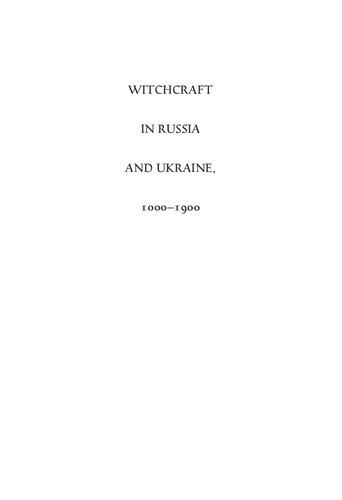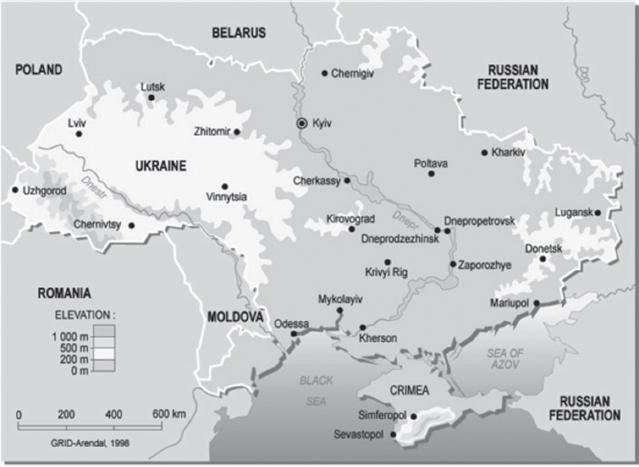Putin's Wars and NATO's Flaws Paul Moorcraft
Visit to download the full and correct content document: https://ebookmass.com/product/putins-wars-and-natos-flaws-paul-moorcraft/
More products digital (pdf, epub, mobi) instant download maybe you interests ...
Evaluating NATO Enlargement: From Cold War Victory to the Russia-Ukraine War James Goldgeier
https://ebookmass.com/product/evaluating-nato-enlargement-fromcold-war-victory-to-the-russia-ukraine-war-james-goldgeier/
Witchcraft in Russia and Ukraine, 1000-1900: A Sourcebook Valerie A. Kivelson
https://ebookmass.com/product/witchcraft-in-russia-andukraine-1000-1900-a-sourcebook-valerie-a-kivelson/
European Identities During Wars and Revolutions: Change Under Crises in Georgia and Ukraine Salome Minesashvili
https://ebookmass.com/product/european-identities-during-warsand-revolutions-change-under-crises-in-georgia-and-ukrainesalome-minesashvili/
Ukraine And The Art Of Strategy Lawrence Freedman
https://ebookmass.com/product/ukraine-and-the-art-of-strategylawrence-freedman/
Roman Error: Classical Reception and the Problem of Rome’s Flaws Basil Dufallo
https://ebookmass.com/product/roman-error-classical-receptionand-the-problem-of-romes-flaws-basil-dufallo/
Why We Teach Science (and Why We Should) John L.
Rudolph
https://ebookmass.com/product/why-we-teach-science-and-why-weshould-john-l-rudolph/
NATO at 70: A Political Economy Perspective 1st ed. Edition Keith Hartley
https://ebookmass.com/product/nato-at-70-a-political-economyperspective-1st-ed-edition-keith-hartley/
Beyond 2%■NATO Partners, Institutions & Burden Management: Concepts, Risks & Models Anessa L. Kimball
https://ebookmass.com/product/beyond-2%e2%80%95nato-partnersinstitutions-burden-management-concepts-risks-models-anessa-lkimball/
Why Surrealism Matters (Why X Matters Series)
Polizzotti
https://ebookmass.com/product/why-surrealism-matters-why-xmatters-series-polizzotti/
Putin’s Wars and NATO’s Flaws
Pen and Sword
By the same author
Axis of Evil: The War on Terror Edited with Gwyn Winfield (2005).
The Rhodesian War: A Military History (with Dr Peter McLaughlin) (2008)
Mugabe’s War Machine (2011).
Total Destruction of the Tamil Tigers: The Rare Victory of Sri Lanka’s Long War (2012).
Omar al-Bashir and Africa’s Longest War (2015)
The Jihadist Threat: The Re-conquest of Europe? (2015)
Dying for the Truth: The Concise History of Frontline War Reporting (2016)
Superpowers, Rogue States and Terrorism: Countering the Security Threats to the West (2017)
Total Onslaught: War and Revolution in Southern Africa Since 1945 (2018)
Deadlines on the Front Line: Travels with a Veteran War Correspondent (2018)
North Korea: Warring with the World (2020)
Churchill’s German Special Forces (2023)
Other non-fiction
A Short Thousand Years: The End of Rhodesia’s Rebellion (College Press, 1979)
Stander: Bank Robber with Mike Cohen (Galago, 1984)
Inside the Danger Zones: Travels to Arresting Places (Biteback, 2010)
Shooting the Messenger: The Politics of War Reporting with Professor Phil Taylor (Potomac, 2008, updated paperback, Biteback, 2011)
It Just Doesn’t Add Up: Explaining Dyscalculia and Overcoming Number Problems for Children and Adults (Tarquin, St Albans, 2015)
Fiction
Anchoress of Shere (Poisoned Pen Press, 2002)
Regression (Millstream, 2012)
Putin’s Wars and NATO’s Flaws
Why Russia Invaded Ukraine
Paul Moorcraft
First published in Great Britain in 2023 by Pen & Sword Military
An imprint of Pen & Sword Books Ltd Yorkshire – Philadelphia
Copyright © Paul Moorcraft 2023
ISBN 978 1 39903 142 4
epub ISBN 978 1 39903 144 8
mobi ISBN 978 1 39903 144 8
The right of Paul Moorcraft to be identified as Author of this work has been asserted by him in accordance with the Copyright, Designs and Patents Act 1988.
A CIP catalogue record for this book is available from the British Library.
All rights reserved. No part of this book may be reproduced or transmitted in any form or by any means, electronic or mechanical including photocopying, recording or by any information storage and retrieval system, without permission from the Publisher in writing.
Pen & Sword Books Limited incorporates the imprints of Atlas, Archaeology, Aviation, Discovery, Family History, Fiction, History, Maritime, Military, Military Classics, Politics, Select, Transport, True Crime, Air World, Frontline Publishing, Leo Cooper, Remember When, Seaforth Publishing, The Praetorian Press, Wharncliffe Local History, Wharncliffe Transport, Wharncliffe True Crime, White Owl and After the Battle.
For a complete list of Pen & Sword titles please contact
PEN & SWORD BOOKS LIMITED
47 Church Street, Barnsley, South Yorkshire, S70 2AS, England
E-mail: enquiries@pen-and-sword.co.uk Website: www.pen-and-sword.co.uk
Or
PEN AND SWORD BOOKS
1950 Lawrence Rd, Havertown, PA 19083, USA
E-mail: Uspen-and-sword@casematepublishers.com Website: www.penandswordbooks.com
Contents
Maps
Timeline of Major Events in this Book
Abbreviations
Glossary
About the Author
Acknowledgements
Introduction
Chapter 1 Are Russians different?
Maps
Ukraine political map. (GRID-Arendal, CC BY-NC-SA 2.0)
Chechnya and Caucasus. (Kbh3rd via Wikimedia Commons, CC BY-SA 3.0)
Georgia, Ossetia, Russia and Abkhazia. (Ssolbergj via Wikimedia Commons, CC BY-SA 3.0)
Ukraine front line Christmas 2022.
Front line August 2023.
Native-born Russian speakers in Ukraine. (Alex Tora via Wikimedia Commons, CC BY-SA 3.0)
Timeline of Major Events in this Book
Yeltsin era
1991 – Russia becomes independent as the Soviet Union collapses and, together with Ukraine and Belarus, forms the Commonwealth of Independent States, which is eventually joined by most former Soviet republics except the Baltic states.
Chechnya declares unilateral independence, beginning a decade of conflict with Moscow.
1992 – Russia takes up the seat of the former Soviet Union on the United Nations Security Council and retains control of its nuclear arsenal.
Acting Prime Minister Yegor Gaidar launches controversial programme of lifting central controls on economy to prevent total collapse. Opponents complain it is poorly managed and directly responsible for hyper-inflation and the rise of the ‘oligarchs’ – businessmen who benefit from crash privatization of massive state enterprises.
1993 – September/October – President Boris Yeltsin sends in troops to seize parliament from opponents of his rule.
1993 – December – Referendum approves new constitution giving president sweeping powers.
Communist and nationalist opposition makes large gains in elections to new Duma parliament.
1994 – Russia joins NATO’s Partnership for Peace programme. Russian troops launch two-year war to recapture the breakaway republic of
Chechnya, which ends with compromise agreement on substantial Chechen autonomy.
1995 – Communist Party emerges as largest party in parliamentary elections, with more than a third of seats.
1996 – Yeltsin re-elected despite concerns about his health. Russia admitted to the G-7 group of industrialized countries. (Suspended in March 2014.)
Yeltsin’s twilight years
1998 – September – New Prime Minister Yevgeny Primakov stabilizes collapsing rouble, ends danger of debt default, and carries out major taxation reform.
Also opposes NATO campaign against Yugoslavia, marking start of Russia’s distancing itself from US foreign policy. He eventually falls out with President Yeltsin, who dismisses him in May 1999.
1999 – August – Armed men from Chechnya invade the neighbouring Russian territory of Dagestan.
President Yeltsin appoints ex-KGB officer Vladimir Putin prime minister with a brief to bring Chechnya back under control.
1999 – December – Yeltsin resigns in favour of Vladimir Putin, who takes over, buoyed by popularity over major military campaign against Chechen rebels.
Putin asserts control
2000 – March – President Putin wins election.
2000 – August – Putin faces criticism over sinking of Kursk nuclear submarine, given his slow response and official obfuscation.
2000 – December – Mr Putin begins steady process of rehabilitating Soviet era by re-instating 1944–1991 anthem with new words.
2002 – May – Russia and the USA announce a new agreement on strategic nuclear weapons reduction.
Russian and NATO foreign ministers set up NATO-Russia Council with equal role in decision-making on terrorism and other security threats.
2002 – October – Chechen rebels seize a Moscow theatre and hold about 800 people hostage. Most of the rebels and around 120 hostages are killed when Russian forces storm the building.
2003 – June – Government axes last remaining nationwide independent TV channel, TVS, citing financial reasons.
2003 – September – Kyrgyzstan grants Russia first military base abroad in 13 years to counter Islamist terrorism.
2003 – October – Yukos oil boss and prominent liberal Mikhail Khodorkovsky arrested on charges of tax evasion and fraud, an early casualty of President Putin’s campaign to drive Yeltsin-era ‘oligarchs’ out of politics. In 2005 he is sentenced to nine years’ imprisonment but is pardoned and goes into exile in 2013.
2003 – December – President Putin’s United Russia wins landslide Duma election victory, buoyed by economic recovery.
2004 – March – Putin wins second presidential term by landslide, consolidating his power.
2004 – August – Authorities seize Yuganskneftegaz, Yukos’s key production unit, over alleged tax debts, in move widely seen as punishment for Yukos boss Khodorkovsky’s opposition to Putin. State formally purchases Yuganskneftegaz in December.
2004 – September – More than 380 people, many of them children, killed when mainly Chechen and Ingush Islamists besiege school in North Ossetia’s Beslan. Prompts boost in state security powers, despite widespread public criticism of handling of siege.
Putin scraps direct election of regional governors, who will henceforth be government appointees.
2005 – February – Moscow and Tehran sign agreement by which Russia will supply fuel for Iran’s Bushehr nuclear reactor and Iran will send spent fuel rods back to Russia.
2005 – March – Chechen separatist leader Aslan Maskhadov killed by Russian forces.
2005 – June – State gains control of Gazprom gas giant by increasing its stake in the company to over 50 per cent.
2005 – September – Russia and Germany sign major deal to build Nord Stream gas pipeline under Baltic Sea between the two countries. Comes on line in 2011.
2006 – January – Putin signs law giving authorities extensive new powers to monitor the activities of non-governmental organisations and suspend them if they are found to pose an alleged threat to national security.
2006 – July – Russia’s most-wanted man, Chechen warlord Shamil Basayev, killed by security forces.
2006 – November – Former Russian security service officer Alexander Litvinenko, an outspoken critic of the Kremlin living in exile in London, dies of polonium poisoning. Britain accuses Russian former security officers of murder.
2007 – March – Dozens detained as riot police break up St Petersburg protest by demonstrators accusing President Putin of stifling democracy.


















